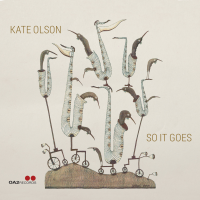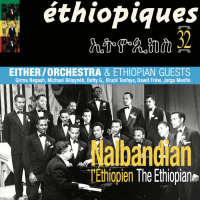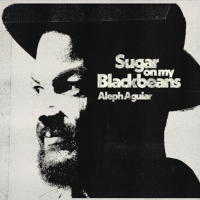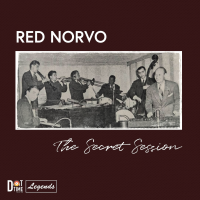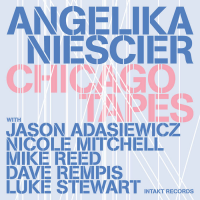Home » Jazz Articles » Bailey's Bundles » Maximum City: The Music of Massimo Urbani
Maximum City: The Music of Massimo Urbani
 In researching this piece, it was necessary that I translate several web pages with biographical information from Italian to English. Using on-line translation software is kind of like using a nuclear hand grenade—it does the job but makes a mess in the process. These software units cannot distinguish between proper names and regular narrative text, thus they try to translate the proper names as well as other text. My subject is the late Italian alto saxophonist Massimo Urbani. The translator I chose interpreted the saxophonist's name as "Maximum City." In a very real way, this is most appropriate. Massimo Urbani was a large, broad man. On the cover photo of Via GT Urbani dwarfs his alto saxophone as he shares the stage with the legendary Giovanni Tommaso. I suspect that Mr. Urbani's temperament was derivative of his name—urbane. I further suspect that he had a big warm personality...when it suited him.
In researching this piece, it was necessary that I translate several web pages with biographical information from Italian to English. Using on-line translation software is kind of like using a nuclear hand grenade—it does the job but makes a mess in the process. These software units cannot distinguish between proper names and regular narrative text, thus they try to translate the proper names as well as other text. My subject is the late Italian alto saxophonist Massimo Urbani. The translator I chose interpreted the saxophonist's name as "Maximum City." In a very real way, this is most appropriate. Massimo Urbani was a large, broad man. On the cover photo of Via GT Urbani dwarfs his alto saxophone as he shares the stage with the legendary Giovanni Tommaso. I suspect that Mr. Urbani's temperament was derivative of his name—urbane. I further suspect that he had a big warm personality...when it suited him.Massimo Urbani was born in Rome into a large family in 1957. His parents were of humble stock, his father working as a janitor at a local high school. He became enamored with jazz at an early age and at 16 years old was first committed to record on Mario Schiano's Sud. According to The All Music Guide, Massimo Urbani appeared on a total of 17 recordings: 10 under his own name, six with other leaders, and one compilation recording. The liner notes of Urbani's finest recording, The Blessing details that the saxophonist died alone at the age of 36 of a heroin overdose on June 24, 1993.
Sergio Veschi had the opportunity to record Massimo Urbani for his RED Records label on several occasions resulting in five releases. Veschi has just released the entire five-CD output of Massimo Urbani's recordings for the label. These five releases are comprised of four discs recorded under Urbani's leadership and one recorded under the leadership of bassist Giovanni Tommaso featuring Urbani. Massimo Urbani was a singular Italian talent who burned brightly for a short time leaving an indelible mark on the face of Jazz. His tone and attack was large and urgent. His technique was studied and his velocity light speed. Massimo Urbani deserves this recognition.
 Massimo Urbani
Massimo Urbani
360 Degree Aeutopia
(RED Records 146, recorded 1979)
Ray Noble's novelty tune, "Cherokee" was one of the vehicles with which Charlie Parker changed jazz. Urbani tears into the tune at a fierce clip with no hint of the original melody. It is not until pianist Ron Burton begins to solo that the familiar line emerges and then submerges into the universe of Be Bop. Drummer Beaver Harris is allowed ample solo room before the ensemble joins back in and completes the piece with the straight melody carried by Urbani. With his Be Bop chops firmly established on this quartet outing, Massimo Urbani show himself an effective balladeer on the lengthy "Tender Song." Urbani and his quartet effectively build a swinging tension in the piece, propelling that tension with space. All of the instruments are easily heard as parts of the overall sum of the song. Urbani de-mystifies Miles Davis' exquisite composition "Solar," turning it into a Be Bop romp. The last three pieces on the disc were written by drummer Beaver Harris. They differ considerably in tone and content from the first three pieces on the disc. The harmonic composition of the pieces reveals a more modern (read that post-Be Bop) vision. Urbani takes them on, soloing con brio on "Rip the Ripper. " "Ballad for a Child" is a drummerless lullaby with Urbani showing off his ballad prowess. "Diddy for Biddy" is a Gospel vamp, opened by Urbani with a swinging abandon full of blues and the church. When this recording was made, Massimo Urbani was 22 years old, already a fully formed artist.
 Massimo Urbani
Massimo Urbani
Dedications
(RED Records 160, recorded 1980)
The 23-year old Be Bop phenomenon, Massimo Urbani took a left turn on his second RED Records release, assembling a recording dedicated to the free spirits of John Coltrane and Albert Ayler. It consists of six length pieces in the Ayler / Coltrane vernacular. The title track, composed by Urbani, opens the disc with style, filled with free jazz exuberance, loud and misbehaving. It is a tone poem for jazz quartet. Urbani plays interludes between bassist Furio Di Castri, drummer Paolo Pellegatti and pianist Luigi Bonafede extended meanderings. Urbani is inspired, frantic, manic, and totally possessed. He spits out more notes than the listener would believe possible. His rhythm section is skin tight, with bassist Di Castri playing impressively. Urbani and crew take the Coltrane standard "Naima, " casting it beautifully as the modern ballad it is. Urbani''s tone is full and virile. Bonafede provides the plaintive "L'Amore" that transmogrifies from quiet pastoral to Bosch Garden of Earthly Delights to A Love Supreme. Urbani's "Max's Mood" continues this vein with his vision of "Chasin' the Trane. " Moreover, never straying too far a field, Urbani duets with Di Castri on Charlie Parker's "Scrapple from the Apple" in a manner that recalls Art Pepper's opening duet with George Mraz on "Anthropology" three years earlier at the Village Vanguard. Solid playing on "Speak Low" and "Soul Eyes" finds the middle ground between Bop and Free jazz.
 Giovanni Tommaso
Giovanni Tommaso
Via G.T. featuring Massimo Urbani
(RED Records 196, recorded 1986)
This disc is most compelling in that it illustrates the RED Records philosophy of encouraging cooperation among musicians, building multiple swinging combos and house musicians. The leader of this disc Giovanni Tommaso and the featured artist, Massimo Urbani support one the other equally. Via G.T. , while a bassist's date from start to finish, does make ample room for the very large presence of Urbani. Tommaso's deft pizzacato is evident from the opening of "Meet You On the Way" to "No Day After, No!" which contains and eerie arco bass-alto duet with Urbani). "Sixteen Blues" contains a jaunty head and solid body of solos, particularly a muted Paolo Fresu on trumpet and an angular Danilo Rea on piano. A very fine recording, indeed.
 Massimo Urbani
Massimo Urbani
Easy to Love
(RED Records 208, recorded 1987)
A 30 year old Urbani recorded Easy to Love. His tone was maturing to a deep controlled luster. He had managed on this recording to unify the Be Bop and Free visions of jazz he had been exploring in previous years. He does this effectively the first of his two compositions "A Trane from the East." Urbani again employs the quartet format with Luca Flores on piano, Furio on bass, and Roberto Gatto on drums. Bassist Di Castri contributes his ballad "Night Walk" which extends the Trane metaphor from the disc opener. Urbani's second composition, "I Got Rock," is almost R & B. The piece opens with some pretty swift Gatto drumming before Urbani's ultra-popularist head. "Star Eyes" is a fast surprise, taken at a heady tempo without ever sounding hurried. The Billie Holiday staple "Good Morning Heatache" is the disc's uneasy center, showing off Urbani''s ballad playing. While not as consistent in vision as his other recordings, Easy to Love is nevertheless superior to most jazz produced in the late 1980s.
 Massimo Urbani
Massimo Urbani
The Blessing
(RED Records 257, recorded 1993)
The Blessing was Massimo Urbani's swan song. Recorded a mere five months before his tragically early death, The Blessing could be viewed as Urbani's Dial recordings, replete with the desperate Lover Man (in this case What's New ) that made or destroyed Charlie Parker in the mid-1940s. That would be if Urbani had been in anything less than perfect control, as he was on February 21 and 22, 1993, when these sides were recorded. Urbani plays with sloppy slurs and growls and then spits out 32nd and 64th notes that will singe the listener's eyebrows. Urbani's solo on drummer Roberto Gatto's composition Drop In is an ironic lesson in excessive pathos and crystalline brilliance. Pianist Danilo Rea plays with the same measured abandon. But perhaps Urbani's nearest improvisational soul mate is Giovanni Tommaso, whose sleek pizzicato solos have largely been ignored in this country. The aforementioned What's New is taken at something a bit faster than a ballad clip. Urbani is inspired and reckless, the two ingredients necessary of an historic performance.
Urbani's touch is golden on the sotto voce ballad Everything Happens to Me as is bassist Tommaso. Danilo Rea delivers perhaps his most inspired soloing on the disc. Parker's My Little Suede Shoes is treated with a jaunty reverence by Urbani, who obviously has fun with the piece and studied the Parker vernacular well. It is pure Be Bop practiced by a great student of the genre. Pianist Rae burns in his solo, with drummer Gatto and bassist Tommaso playing a very effective duet in the composition's interior. The performance is so good; I prefer it to the original, mostly for sonic, but also technical reasons. Urbani transforms The Way You Look Tonight in the same way Parker transformed Embraceable You , making the briefest statement of the melody in the head and then heading for parts unknown. Urbani plays with ferocious conviction. The saxophonist's own Blues for Bird is pure soul, a recital for solo alto saxophone. Urbani crammed his entire short life into four minutes. The Blessing is a great note to end on, or, begin with as an introduction to this briefly captured superior talent.
Visit Red Records on the web.
Tags
PREVIOUS / NEXT
Support All About Jazz
 All About Jazz has been a pillar of jazz since 1995, championing it as an art form and, more importantly, supporting the musicians who make it. Our enduring commitment has made "AAJ" one of the most culturally important websites of its kind, read by hundreds of thousands of fans, musicians and industry figures every month.
All About Jazz has been a pillar of jazz since 1995, championing it as an art form and, more importantly, supporting the musicians who make it. Our enduring commitment has made "AAJ" one of the most culturally important websites of its kind, read by hundreds of thousands of fans, musicians and industry figures every month.








